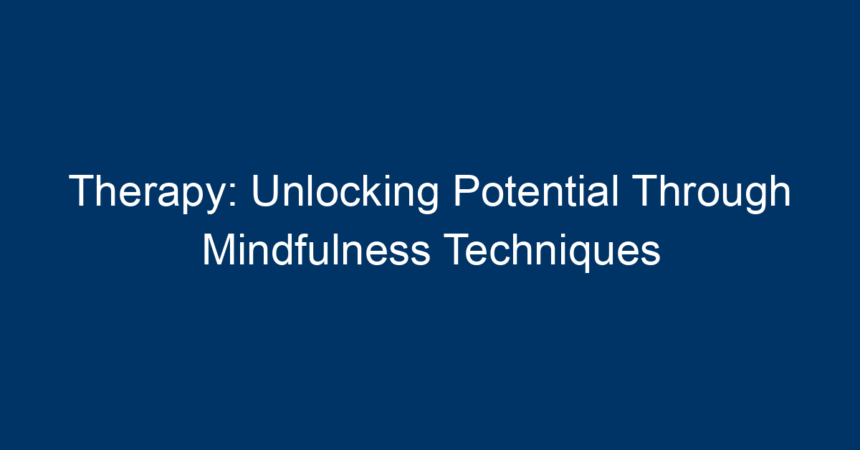Introduction
In an increasingly fast-paced world, the quest for mental well-being has never been more crucial. Therapy is often viewed as a path to healing, growth, and self-discovery. Among the various forms of therapy, mindfulness techniques have emerged as a powerful tool to help individuals unlock their potential and cultivate emotional resilience. This article delves into how mindfulness practices within therapy can transform mental health, enhance emotional intelligence, and foster personal growth.
Understanding Therapy and Mindfulness
What is Therapy?
At its core, therapy is a collaborative process between a trained mental health professional and an individual seeking support. The primary goal of therapy is to address emotional challenges, behavioral issues, and mental health disorders. Various therapeutic modalities exist, from cognitive-behavioral therapy (CBT) to humanistic approaches, each offering unique benefits.
The Essence of Mindfulness
Mindfulness refers to the awareness that arises from paying attention to the present moment without judgment. Rooted in ancient practices such as meditation, mindfulness has gained popularity in modern therapy due to its ability to ground individuals in their current experiences. This practice not only enhances self-awareness but also reduces anxiety and fosters a more balanced emotional state.
The Synergy Between Therapy and Mindfulness
Integrating mindfulness into therapy creates a holistic approach to mental health. Here are some ways these two powerful methodologies complement each other:
Enhanced Self-Awareness
Therapy encourages individuals to explore their thoughts, emotions, and behaviors. Mindfulness techniques facilitate this exploration by providing the tools to observe these aspects without judgment. For instance, practices such as breath awareness and body scans allow individuals to connect with their inner selves, unlocking insights that may previously have been overlooked.
Stress Reduction
One of the primary tools in therapy is coping strategies for managing stress and anxiety. Mindfulness has been scientifically proven to reduce stress levels. Techniques such as mindful breathing and progressive muscle relaxation help calm the mind and body, enabling individuals to face their challenges with greater emotional clarity.
Improved Emotional Regulation
Mindfulness practices cultivate a deeper understanding of one’s emotions. In therapy, clients learn to identify triggers and manage their responses. By equipping individuals with mindfulness techniques, therapists provide valuable skills for emotional regulation, enabling better interactions in both personal and professional relationships.
Key Mindfulness Techniques in Therapy
1. Mindful Breathing
Mindful breathing is a fundamental technique in mindfulness therapy. It involves focusing attention on the breath, observing its natural rhythm. This practice helps individuals anchor themselves in the present moment, reducing overwhelming feelings of anxiety or stress. Therapists guide clients in various breathing exercises that can be easily incorporated into daily life.
2. Body Scan Meditation
Body scan meditation is a technique that involves mentally ‘scanning’ the body from head to toe, paying attention to sensations, tensions, and areas of discomfort. This practice enhances body awareness and encourages relaxation. In therapy, it helps individuals connect with their physical selves, fostering a sense of grounding and stability.
3. Mindful Observation
Mindful observation involves taking the time to notice one’s surroundings without rushing to judgment. During therapy sessions, clients might be encouraged to observe their thoughts, feelings, or even objects in the room. This technique emphasizes the importance of being present and can shift focus away from distressing thoughts.
4. Loving-Kindness Meditation
Loving-kindness meditation promotes feelings of compassion and love towards oneself and others. Often used in therapy to combat negative self-talk, this technique helps cultivate a sense of connection and reduces feelings of isolation. By practicing loving-kindness, individuals can transform their internal dialogue and develop a more positive self-image.
The Impact of Mindfulness Techniques on Mental Health
Reducing Symptoms of Anxiety and Depression
Research indicates that integrating mindfulness techniques in therapy effectively reduces symptoms of anxiety and depression. By fostering a non-judgmental awareness of thoughts and feelings, individuals can break free from cycles of negativity and despair. Therapists often tailor mindfulness practices to address specific mental health issues, leading to heightened coping skills and resilience.
Enhancing Focus and Concentration
In our digitally distracted world, many struggle with maintaining focus and concentration. Mindfulness encourages individuals to practice selective attention, enhancing cognitive clarity. Therapists often provide mindfulness exercises that improve concentration, which can be beneficial for tasks ranging from daily responsibilities to long-term goals.
Fostering Improved Relationships
Mindfulness techniques not only enhance self-awareness but also improve interpersonal dynamics. When individuals practice mindfulness, they become more attuned to their emotional states, fostering healthier communication. Therapy often includes mindfulness exercises that promote active listening and empathetic responses, leading to more fulfilling relationships.
Practical Steps to Incorporate Mindfulness into Therapy
Set Clear Intentions
Begin your therapy journey by setting clear and achievable intentions. Discussing your goals with your therapist and integrating mindfulness techniques that resonate with you can create a personalized therapeutic experience.
Daily Mindfulness Practice
Practice mindfulness daily, even if only for a few minutes. Techniques such as mindful breathing or body scans can be easily incorporated into your routine. Consistency is key to reaping the benefits of mindfulness in therapy.
Reflect on Progress
Regularly reflect on your progress and experiences in therapy. Journaling about your mindfulness practice can deepen self-awareness and provide insights into your emotional journey. Discuss your reflections with your therapist to explore breakthroughs or challenges.
Patient Persistence
Remember that exploring mindfulness is a journey. It may take time to cultivate awareness and emotional responses. Approach this process with patience and persistence to unlock your true potential.
Conclusion: Unlocking the Potential Within
Therapy offers a profound pathway to self-discovery, healing, and growth. When combined with mindfulness techniques, therapy can unlock potential and enhance mental well-being in transformative ways. Through practices such as mindful breathing, body scans, and loving-kindness meditation, individuals can cultivate resilience, improve emotional regulation, and foster healthier relationships.
By embracing mindfulness within therapy, you can embark on a life-changing journey toward emotional clarity, resilience, and fulfillment. Whether you are just beginning your therapeutic journey or looking to deepen your practice, these insights and techniques provide a powerful foundation for mental health empowerment. Take the first step today, and unlock the potential within you through the transformative power of mindfulness in therapy.




